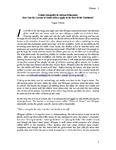Gender Inequality in African Education: How Can the Lessons of South Africa Apply to the Rest of the Continent?

View/
Author
Gibson, Sally Logan
Subject
Washington and Lee University, Shepherd Poverty Program
Capabilities approach (Social sciences)
South Africa
Sex discrimination against women
Sub-Saharan Africa
Human capital
Poverty
Race discrimination
Metadata
Show full item recordDescription
Sally Logan Gibson is a member of the Class of 2008 of Washington and Lee University. Capstone; [FULL-TEXT FREELY AVAILABLE ONLINE] The worldwide problem of unequal female education cannot be solved by domestic policies alone, and the global institutional order must bend to the necessity of human rights and equality. Promoting growth is not a sufficient way to promote education for women, and indeed, development theorists that focus solely on maximizing economic growth are likely to shortchange female education.78 Additional focused state action must be applied to specifically target and empower women.
South Africa's position as the leading economy on the African continent ensures its importance as a model for many African countries as they struggle to break free from corrupt practices and embrace the economic growth and human rights reform that result from democratization. But as these African nations struggle to break into the global market, they must be mindful of the importance of equitably educating their women both from a moral perspective and an economic efficiency perspective. [From Conclusions and Policy Prescriptions] Logan Gibson